- Proficient English(숙달된 영어), Passable English(소통 가능한 영어), Decent English(품위 있는 점잖은 영어), Authentic English(믿을 만한 정격 영어), More Englishlike English(보다 영어다운 영어), Fluent English(물 흐르듯이 거침이 없는 영어), Intelligible English(남이 알아들을 수 있는 영어), Proper(Safe) English(상황에 꼭 들어맞는 영어)로 가는 지름길을 찾고 있습니까?
- 그동안 ‘이윤재의 Total English’에선 시사적인 주제로 독특한 글들을 보여드렸지만, 앞으로는 체계적 순서(Systematic Order)에 따라 구체적이고 실질적인 영어학습 정보를 제공하고자 합니다. 독해 작문 회화에 두루 도움이 되는 새로운 방식의 영어칼럼을 선보입니다.‘편집자’
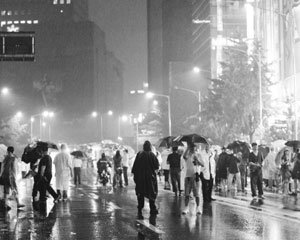
No one has dared question his use of English. Not only did Churchill raise the arts of invective and exhortation to new heights, but he often took time out from the pressures of war to admonish officials up with whose grammar he would not put. “Why must you write ‘intensive’ here? ‘Intense’ is the right word,” he wrote to the director of military intelligence. “You should read Fowler´s Modern English Usage on the use of the two words.”
(지금까지 그의 영어사용 능력에 대하여 감히 의문을 제기한 사람은 아무도 없다. 처칠은 독설을 퍼붓고 훈계를 하는 기교까지 탁월했다. 그는 종종 전쟁의 와중에서도 짬을 내어 관공리의 잘못된 문법을 참지 못하고 훈계했다. 그는 군(軍)정보국장에게 이렇게 써 보냈다. “왜 intense(강렬한)를 써야 할 자리에 intensive(집중적인)를 사용했느냐? 두 단어의 사용에 대하여 ‘ Fowler´s Modern English Usage’를 읽어봐.”)-1994년 5월13일자‘ International Herald Tribune’
※intense 와 intensive 비교
■ intense: 사물의 결과적 현상을 나타내
는 형용사
·intense gale 맹렬한 강풍
·intense discussion 격렬한 토의
·intense competition 격렬한 경쟁
■ intensive: 사람의 인위적 의도를 나타
내는 형용사
·intensive farming 집약농업
·intensive instruction 집중교육
·intensive investigation 철저한 조사
·intensive bombardment 집중적 폭격
[작문]
(1)그는 3주간 집중 치료를 받아야 했다.
(2)세계적인 경쟁이 가열됨에 따라 우방 간의 스파이 활동이 치열해질 것이다.
(3)지식 집약형 산업은 세계 경제에서 어느
때보다도 더 큰 비중을 차지하고 있다.
(1)He needed intensive care for three
weeks.
(2)As global competition heats up,
spying among allies will grow intense.
(3)Knowledge-intensive industries
are forming an ever-greater part of
the world economy.
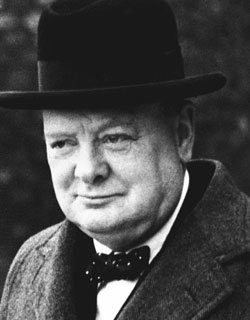
노벨문학상을 받은 처칠은 자신의 글에 대한 자부심이 대단했다.
단어의 위치가 잘못된 것은 단추를 잘못 낀 것과 같다. 전치(前置)사는 그 명칭처럼 원칙적으로 목적어 앞에 전치(前置: 앞 전 · 둘 치)한다. 다시 말해 전치사를 문장 끝에 두는 글쓰기를 피해야 한다. 그러나 반드시 그런 것은 아니다. 오히려 전치사를 후치(後置: 뒤 후 ·둘 치)해야 하는 경우가 있다. 전치사의 위치에 관한 윈스턴 처칠(Winston Churchill)의 다음 일화는 정곡을 찌른다.
When an editor dared to change a sentence of Churchill´s that appeared to end inappropriately with a preposition, Churchill responded by writing to the editor, “This is the kind of impertinence up with which I shall not put.” His purpose, of course, was to illustrate the awkwardness that can result from rigid adherence to the notion that prepositions at the end of sentences are always incorrect.
(전치사로 끝낸 처칠의 문장이 부적절하게 보였던지 편집자가 무엄하게도 그 문장을 바꾸어놓았다. 처칠은 그 편집자에게 “This is the kind of impertinence up with which I shall not put(이것은 내가 결코 참지 못하는 주제넘은 짓이다)”라고 메모해 보냈다. 당연히 그는 ‘전치사가 문장 끝에 오는 것은 언제나 눈에 거슬린다’는 원칙을 무조건 고수함으로써 생길 수 있는 어색함을 실례를 들어 설명하고자 했던 것이다.)
[해설]
(1) 글쓰기 규칙 A: 전치사로 문장을 끝
내는 것은 좋지 않다.
[작문]
나는 내가 사는 집이 있다.
·I have a house in which I live.
·I have a house which I live in. (눈에
거슬리는 문장)
(2) 글쓰기 규칙 B: ‘동사·부사·전치사’가 강하게 결합된 관용구를 분리시키는 것은 좋지 않다.
[작문]
나는 그녀에게서 내가 참을 수 없는 무
례함을 발견했다.
·I find in her a rudeness which I can
not put up with.
·I find in her a rudeness with which I
cannot put up. (눈에 거슬리는 문장)
Usage-Based Grammar란?
‘관용적 표현’ ‘관용적인 어구’ 등에서 관용(慣用)이란 ‘오랫동안 써서 굳어진 대로 늘 쓰는 것’을 말한다. 좌천(左遷)의 반대개념으로 영전(榮轉)·승전(升轉)·우천(優遷)이라는 말은 써도 ‘우천(友遷)’이라는 말은 쓰지 않는다. 법칙으로 보면 그럴듯한데도. 여기에서 바로 Usage is the final arbiter of correctness(관용어법이 정확성의 최종 결정권자)라는 공식이 확립된다.
자연적으로 많이 통용되는 말이 생존력을 갖게 되어 결국 원칙과 규정으로 자리 잡는다. Grammar for Practical Use(실용문법)는 결과적 산물이요, 자연적 산물이다. 미국인의 문법 기준은 철저히 Usage(관용)에 초점이 맞춰져 있다.
UC 버클리대(The University of California at Berkeley) 언어학자 넌버그(Geoffrey Nunberg·1945~)는 미국의 시사교양잡지 ‘The Atlantic Monthly’(1983년 12월호)에 기고한 ‘The Decline of Grammar (문법의 쇠퇴)’라는 제하의 글에서 The eighteenth-century grammarians accepted the doctrine that usage was the final arbiter of correctness(18세기 문법학자들은 관용이 정확성의 최종 결정권자라는 원칙을 받아들였다)라고 언급한 바 있다.
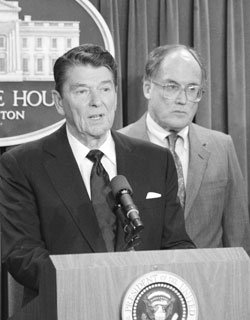
레이건 전 미국 대통령은 강한 긍정을 표현하기 위해 이중 부정어법을 사용하기도 했다.
학교문법(school grammar)은 규범문법[normative (prescriptive) grammar]이다. 언어의 올바른 사용이라는 목적을 전제로 설정된 규칙이다. 이것은 설정된 규칙에 따른 언어 사용을 강요하며 제약한다. 반면 기술(記述)문법(descriptive grammar) - 혹은 실용문법(practical grammar) - 은 특정한 시기의 언어현상을 있는 그대로 기술한다. 기술문법은 규범문법에서 말하는 올바른 문장뿐만 아니라, 옳지 않다고 판단되는 문장일지라도 원어민(native speaker)에 의해 자주 쓰이면 분석 대상으로 삼는다. 그래서 다음과 같은 정의가 내려진다.
School grammars for the speakers of a standard language are not descriptive but prescriptive; that is, they are rule books of what is considered correct. But linguistics is descriptive, not prescriptive.
(표준 언어를 말하는 사람을 위한 학교문법은 기술적(記述的)이 아니라 규범적(規範的)이다; 즉 학교문법은 정확하다고 검토된 것으로 꾸며진 규칙서다. 그러나 언어는 규범적인 것이 아니라 기술적이다.)
교과서의 지문이나 문법참고서의 예문은 견본문장이며 실용문과 거리가 있다. 학교문법(school grammar)에서는 용납될 수 없는 비(非)문법적 실용문을 보자.
If we take highway 1 and B line straight for San Francisco, we could be there by dawn.
(1번 고속도로 B라인으로 똑바로 가면 새벽에는 샌프란시스코에 도착할 수 있을 거야.)
take를 보면 종속(조건)절은 직설법 현재 문장이다. 그렇다면 주절도 직설법 현재 문장이 나와야 하므로 현재형 조동사 can이 나와야 마땅하다. 반대로 생각해도 문법적 오류를 피할 수 없다. could를 보면 주(결과)절은 가정법 과거 문장이다. 그렇다면 종속(조건)절도 가정법 과거의 문장이 나와야 하므로 과거형 조동사 took이 나와야 마땅하다.
결국은 가정법 과거가 직설법 현재에 침투한 현상이거나, 아니면 직설법 현재가 가정법 과거에 침투한 현상이다. 문법적 오류로 보이지만 원어민들은 이 같은 문장을 서슴없이 구사한다. 더 나아가 현지의 신문방송 등 대중 매체에서도 문법규칙에 맞지 않는 문법파괴 현상을 수없이 많이 접할 수 있다.
사실 이런 경우는 대화체뿐만 아니라 강연에서도 나타난다. 아인슈타인(Ein- stein)이 1939년 5월19일 프린스턴 대학에서 한 강연의 한 대목을 보자. If there is any religion that would cope with modern scientific needs, it would be Buddhism.(현대의 과학적 요구에 대처할 종교가 있다면 그것은 불교가 될 것이다.) is는 직설법 용법이고 두 개의 would는 가정법 용법이다.
이중 부정에는 ‘강한 부정’의 뜻도
레이건(Reagan) 전 미국 대통령(재임기간 1981~89)은 1992년 공화당 전당대회에서 부시(아버지 부시)에게 힘을 실어주기 위해 다음과 같이 연설했다.
Let us all renew our commitment. Renew our pledge to, day by day, person by person, make our country and the world a better place to live. Then when the nations of the world turn to us and say, “America, you are the model of freedom and prosperity.” We can turn to them and say, “you ain´t seen nothing, yet! ”
(우리 모두는 우리의 약속을 새롭게 합시다. 날마다 사람마다 우리의 맹세를 새롭게 합시다. 우리나라와 세계를 더 살기 좋은 곳으로 만듭시다. 그래야 전세계가 우리에게 “미국이여, 당신네는 자유와 번영의 귀감입니다”라고 말할 때, 우리는 그들을 향하여 “뭔가 보여드리겠습니다! ”라고 말할 수 있습니다.)
‘여러분은 아직 어떤 것도 보지 못했어요.’ 즉 ‘여러분에게 곧 뭔가 보여드리겠어요’의 영어 표현은 원래 “you ain´t seen anything, yet! ”인데, ‘보지 못했어요’를 강조하기 위해 부정어를 하나 더 추가한 것이다. 여기서의 ‘부정+부정’은 ‘강한 긍정’이 아니라 ‘강한 부정’이다. 우리말도 마찬가지다. ‘탈() 없이 지내다’나 ‘무탈(無)하게 지내다’로 말해야 하는데 ‘무탈(無)없이 지내다’로 말하는 사람도 있다. ‘부정+부정’이 ‘강한 부정’도 된다는 관용규칙을 새로 받아들여야 한다.
사회에 규범이 있듯 규범을 따지는 사람을 grammar stickler(문법적으로 까다로운 사람)나 hair-splitter(일을 세세하게 따지는 사람)로 치부해서는 안 된다. 규범에 맞고 논리를 잘 갖춘 언어의 구사는 세련된 지성인[accomplished intellectual (highbrow)]으로 가는 길이다.
The devil is in the details
The devil is in the details(악마는 세밀한 부분에 깃들어 있다)에 대해서 ‘The New Dictionary of Cultural Literacy. Third Edition. 2002’는 이렇게 설명한다.
Even the grandest project depends on the success of the smallest components. This version of the proverb often implies that the details might cause failure.
(아무리 큰 계획이라 할지라도 그것은 대단히 작은 구성요소의 성공에 달려 있다. 흔히 이 속담은 세세한 일이 실패의 원인이 될 수 있음을 의미한다.)
이 말을 부정버전(negative version)이라고 한다면 긍정버전(positive version)으로는 God is in the details(신(神)은 세밀한 부분에 깃들어 있다)가 된다. 이 두 말은 겉으로 볼 때는 서로 모순적이지만 함축하고 있는 의미는 같다. 이제 우리는 모든 분야에서 세세한 부분에까지 신경 써야 할 때다. 영어 체득에서도 마찬가지다.
‘예1’
제3차 세계대전a third world war
제3세계의 전쟁a third-world war
a third world war
(third가 world war를 수식)
a third-world war(third-world가 war를 수식)
[작문]
월남은 1960년대에 제3세계의 지정학적
분쟁지역이 되었다.
In the 1960´s, Vietnam became a third
-world geopolitical hot spot.
[해설]
‘제2차 세계대전’은 the second world war이지만, ‘제3차 세계대전’은 a third world war다. ‘21세기’는 the twenty-first century, ‘22세기’는‘the twenty-second century’다. 제3차 세계대전은 일어날 수도 있고 안 일어날 수도 있는 미정의 사실이기 때문에 [a]를 붙이지만, 22세기는 세월이 지나면 마땅히 도래하기 때문에 [the]를 붙인다.
‘예2’
비핵의 한반도
a nuclear-free Korean Peninsula
한반도 핵문제
the nuclear issue on the Korean peninsula
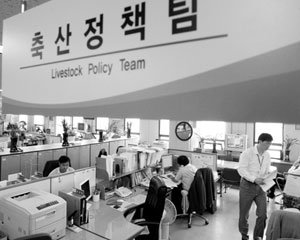
농림수산식품부가 미국 관보에 실린 글을 번역하면서 ‘unless’를 문맥에 맞지 않게 번역해 논란이 됐다.
필자가 이 원고를 쓰고 있는 2008년 9월29일 현재 ‘비핵화의 한반도’는 아직 이루어지지 않은 미정 사실이기 때문에 부정관사를 붙이지만, ‘한반도 핵문제’는 기정사실이기 때문에 정관사를 붙인다.
‘예3’ Unless의 뜻도 제대로 모르는 한국 관리들
정부가 미국산 쇠고기 수입재개협상과 관련해 미국의 ‘동물성사료 금지조치’를 국민에게 설명하는 문답자료에서 오역했다. 미 식품의약청(FDA)이 4월25일자 미국연방관보에 게재한 원문을 보자.
The entire carcass of cattle not inspected and passed for human consumption is also prohibited unless the cattle are less than 30 months of age, or the brains and spinal cords have been removed.
[‘도축검사를 통과하지 않아 식용으로 쓸 수 없는 소는 (동물사료로) 금지된다. 다만 30개월 미만 소나 뇌와 척수를 제거한 소는 제외된다.’ 즉 ‘30개월 미만의 소는 도축검사를 받지 않아도 사료로 사용될 수 있고 30개월 이상의 소도 뇌와 척수를 제거하면 사료로 사용될 수 있다’는 의미다.]
[해설1]
not inspected and passed에서 not이 inspected만 부정하느냐 passed도 부정하느냐는 문제로 ‘MBC 백분토론’에서 독해 논쟁이 벌어졌다. 이 문제에 대한 정답은 간단하다. inspected and passed(검사 통과된)는 한 단어로 취급되는 collocation(연어 連語)이다. 이는 연어에 대한 학습 부족이 초래한 사례다.
[해설2]
또 하나는 unless다. unless는 ‘if~not(만약 ~이 아니라면)’이라는 [조건] 개념보다는 ‘~은 제외다’는 [제외] 개념이 강하다.
|
원문을 번역하면서 unless를 even though(비록∼라 할지라도)로 오역했다. 그 때문에 농림수산식품부에서는 보도 자료에서 미국 측의 조치와는 정반대로 ‘30개월 미만 소라 할지라도 도축검사를 통과한 소만 사료로 쓰일 수 있다’고 잘못 설명했다. 즉 미국의 동물사료 금지 조치가 강화됐기 때문에 사료에 대한 지나친 우려를 할 필요가 없으며 우리는 미국산 쇠고기를 안심하고 먹어도 된다고 했던 것이다. 우리는 미국연방관보의 고시조차 제대로 번역하지 못할 정도로 건성이었다. 그 건성으로 인해 우리는 얼마나 많은 비용을 치렀던가?


















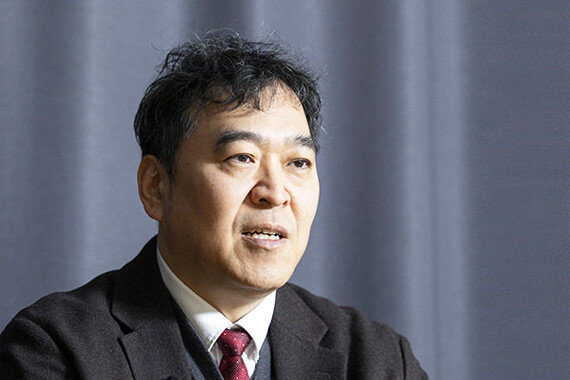

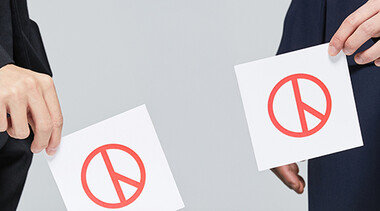
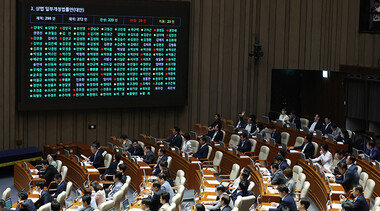
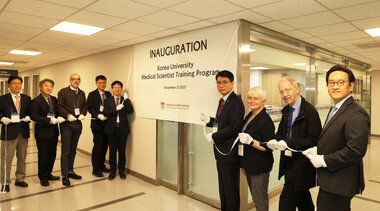
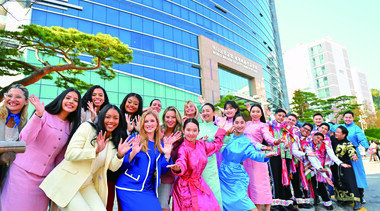
![[지상중계] 제12회 나지포럼, “북미 정상회담 성과내기 어려워”](https://dimg.donga.com/a/380/211/95/1/ugc/CDB/SHINDONGA/Article/69/43/48/32/69434832107aa0a0a0a.jpg)
